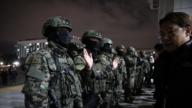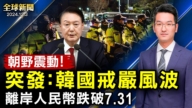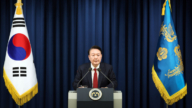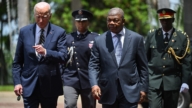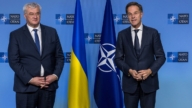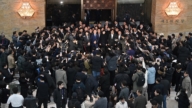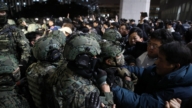【新唐人2011年12月9日讯】美中国防部第12次防务磋商12月7号在北京举行,这是美国9月宣布对台湾军售,以及美军加强在亚太地区部署后,中美军方的首次接触。外界分析,美国最近完成了争夺亚太主导权的一系列战略部署之后,美中军方紧张关系降温,减低了亚太地区发生军事冲突的风险。
这次美中防务磋商,由美国国防部副部长弗卢努瓦(Michele Flournoy)和中共军方副总参谋长马晓天主持,主要是在扩大两军共识、管控风险、避免误判。
《德国之声》指出,这一双边会谈如期举行,显示两国都对维持安全合作关系十分重视。过去,美中防务磋商曾经多次被中方以各种原因单方面取消过。
英国《BBC》报导,美国副防长弗卢努瓦在会谈中再次强调,美国在亚太地区的军事部署不是为了围堵中国。她指出,关于“美中冲突不可避免”的观点是完全错误的。
近来,中共加速发展隐形战机、航空母舰等高端武器,海军舰艇多次穿越第一岛链,在南中国海与菲律宾、越南等国频频发生主权争端。
而美国的回应则是宣布对台军售、外交政策重返亚洲、主张南中国海航行自由,与菲律宾、越南、韩国、日本等国联合军演,以及宣布在澳洲驻军,等等。中美在亚太地区摩擦日益加深,因此,这次美中防务磋商令外界关注。
就在前一天,中共中央军委主席胡锦涛对海军官员发表讲话,要求加快推进海军现代化转型建设,拓展深化“军事斗争准备”。
针对中共领导层这一罕见的强硬言论,美国五角大楼发言人利特勒(Georges Little)回应说:“中国有权发展其军事力量。但美方希望北京当局在军事问题上能够透明。”
香港《东方日报》报导,长期关注中国海权、领土问题的全国政协委员刘梦熊透露,近来解放军内部有一种声音,以海军能力不足作为中央在南海政策上软弱的解释。
他认为,胡锦涛的表态显示中共在东海、南海等问题上,将由软弱无力变成软硬兼施。报导援引分析指出,中国与周边国家经济互动密切,一旦发生战事势必拖垮区内经济。
纽约城市大学政治学教授夏明向《新唐人》表示,南海确有发生军事冲突的可能。
夏明:“南海有点复杂在什么地方呢,因为南海有许多的国家在那边搅在一起,有可能中国跟某一个国家,比如中国跟越南就有那些火拼,中国跟菲律宾也有那些冲突。所以,应该说,南海发生军事冲突的可能性是非常大的。但是,问题是这个军事冲突是否能够上升到美国直接卷入跟中国进行冲突的这么一个局面。”
美国副防长弗卢努瓦在7号的会谈上表示,明年对于美中关系来说将是“意义重大”的一年,因此两国在一系列重要问题上加强合作是非常重要的。这番话暗指两国明年都面临权力更迭:美国大选和中共十八大。
夏明教授认为,在这种情况下,中美都避免在亚太直接发生军事冲突。
夏明:“因为中国它现在国内要担心的问题实在太多,我不认为美国跟中国两国都愿意把这个危机变成一种武装冲突。所以我觉得,可能有小的火拼、区域性的小规模冲突,但是不大会出现一个大规模的战争,这种前景至少目前还没有可能。”
时事评论员文昭指出,尽管独裁体制下,中共一直有可能利用战争来转移国内矛盾,但也会导致中共内部权力格局的变数,加剧政治、经济、社会危机,加速中共自身的崩溃。
新唐人记者常春、李元翰、 萧宇采访报导。
US-China Military Tensions Cool Down
The 12th US-China Defense Consultative Talks were held
in Beijing on December 7th.
The talks came after the U.S. announced its arms sales
to Taiwan, and its strengthening of military alliances in Asia.
Analysts say that after the recent U.S. deployments of
strategies to gain dominance in the Asia-Pacific regions,
the US-China military tensions have cooled down,
reducing the risk of military clashes.
The US-China Defense Consultative Talks covered issues
on how to expand common ground and various topics
such as managing and controlling risks
and avoiding miscalculations.
The bilateral talks were hosted by the U.S.
Under Secretary of Defense, Michèle Flournoy and the
Chinese Communist Party (CCP) Military’s
Deputy Chief of Staff, Ma Xiaotian.
German broadcaster Deutsche Welle says the
bilateral talks took place as scheduled,
a sign that both the U.S. and the Chinese regime
is taking security cooperation seriously.
The Chinese regime’s authorities are known to have
cancelled previous U.S.-China defense talks in the past.
The U.S. Under Secretary of Defense, Michèle Flournoy,
stressed that U.S. military deployments in the Asia Pacific region are not aiming at China, according to a BBC report.
Flournoy also pointed out that comments such as U.S-China
conflicts being inevitable are completely wrong.
Recently the Chinese regime has increased the development
of high-end weapons i.e. stealth fighters and aircraft carriers.
The regime has a history of disputes
with South China Sea countries
.i.e. Philippines and Vietnam, with its naval vessels
often breaking through the Pacific Ocean’s first island chain.
The U.S. in response strengthened its Return-to-Asia foreign
policy, calling for freedom of navigation in the South China Sea.
The U.S. sold arms to Taiwan, joined military drills with the
Philippines, Vietnam, Korea and Japan, and planned a military base in Australia.
The continued Sino-U.S. frictions has put Beijing’s
12th US-China Defense Talks center stage.
Just one day before the U.S-China defense talks, Hu Jintao,
the Central Military Commission Chairman,
asked the navy to speed up it’s modernization and
to prepare itself for warfare.
Georges Little, the U.S. Pentagon Press Secretary, said the
Chinese regime has “the right to develop its military power”
but they “repeatedly call for transparency from the Chinese".
The Hong Kong’s Oriental Daily reports that Liu Mengxiong,
member of the national committee of the Chinese Communist Party (CCP),
claims an insider of the People’s Liberation Army says the
Chinese regime is using its inferior naval capacity as an excuse for the regime’s weak South China Sea policies.
Liu Mengxiong says Hu Jintao’s remarks may be showing
signs that the Chinese regime could adopt a carrot and stick policy on East and South China Sea issues.
Analysts say that due to tight economic interactions between
China and neighboring countries, the regional economies would suffer greatly in the event of a war.
But other analysts do believe in a possible military conflict in
the South China Sea, as explains Xia Ming, a City University of New York Professor.
Xia Ming: “The South China Sea situation is a bit complicated,
as the region involves so many neighboring countries.
There is is possibility of conflict between China and
another nation, like Vietnam or the Philippines.
So I think there’s a great chance the South China Sea
will get into military conflicts.
But the question is whether the U.S. would directly
get involved and confront China.”
The U.S. Under Secretary of Defense said during the talks
that 2012 would be a “significant" year for US-China relations.
The U.S. will held its presidential elections and the Chinese
Communist Party (CCP) its 18th Congress.
Therefore it was important for both sides to strengthen
cooperation on a range of issues says Michèle Flournoy.
Professor Xia Ming added that in this context, both sides
should avoid a direct military conflict in the Asia Pacific.
Xia Ming: “Since in China, the Chinese authorities are loaded
with so many problems to worry about,
I do not think both countries are willing to evolve this crisis
into an armed conflict.
So small or regional conflicts seem more likely than greater
power conflicts. “
Commentator Wen Zhao points out, that although the
Chinese regime has the potential to divert attention from
its domestic troubles by initiating warfare overseas,
its trick can also give rise to a pattern of power within the Chinese Communist Party (CCP).
This variable would intensify crises in politics, economy
and society, accelerating the collapse of the regime itself.
NTD reporters Chang Chun, Li Yuanhan and Xiao Yu


